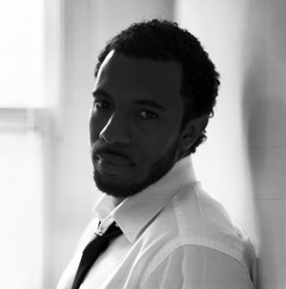Daily Conscription
“We can no longer afford that particular romance.”
—James Baldwin
Brother Rickey halts me before I cross East
Capitol. He trumpets that we are at war.
I want to admit that I don’t believe in “white”
—in the manner that Baldwin did not—but Brother
Rickey would simply retort that my disbelief
is no immunity from the imaginations of those
who think themselves “white.” As we await
the stoplight’s shift—so I may walk and he may
holler “Final Call!” between lanes of idle traffic—
I think of race as something akin to climate change,
a force we don’t have to believe in for it to kill us.
I once believed in the seasons. (I fantasize
fall as Brother Rickey’s favorite—when his suits,
boxy and plaid, would be neither too hot nor
thin.) But we are losing spring and fall—tripping
from blaze to frost and back. And what’s to say
we won’t soon shed another season, one of these
remaining two, and live on either an Earth
of molten streets or one of frozen light? That’s when
worlds end, no—when, after we’ve eradicated
ourselves, we become faint fossils to be exhumed
by the curiosities of whichever life-forms follow
our reign? I still owe Brother Rickey two dollars
for the paper he last placed in my hand, calling me
“soldier.” I don’t have to believe that I am enlisted
in order to understand he’ll forgive my debt
so long as this idea of “whiteness” sorties above us—
ultraviolet, obliging an aseasonal, unending deployment.
Released by the signal, I advance—my head down,
straining to discern the crossfire from the cover.
Copyright © 2017 by Kyle Dargan. Originally published in Poem-a-Day on August 22, 2017, by the Academy of American Poets.
“I’m always writing about Washington, D.C.—at the ground level—and the corners of East Capitol and Benning Road in Southeast D.C. mark a psychically charged nexus for me. On one corner, I watched a woman wailing after the Darren Wilson verdict. It’s an intersection that floods heavily as the thunderstorms passing through the region have strengthened. And it’s where I pass and palaver with Brother Rickey from the mosque. And even though it is outside, it represents a blk interior space (thinking of Elizabeth Alexander’s The Black Interior)—the D.C. within the political Washington that is simultaneously healing and vexing and at threat of being lost to demographic inversion. The poem is an attempt to capture the mental strain from the knot all these threads create.”
—Kyle Dargan

